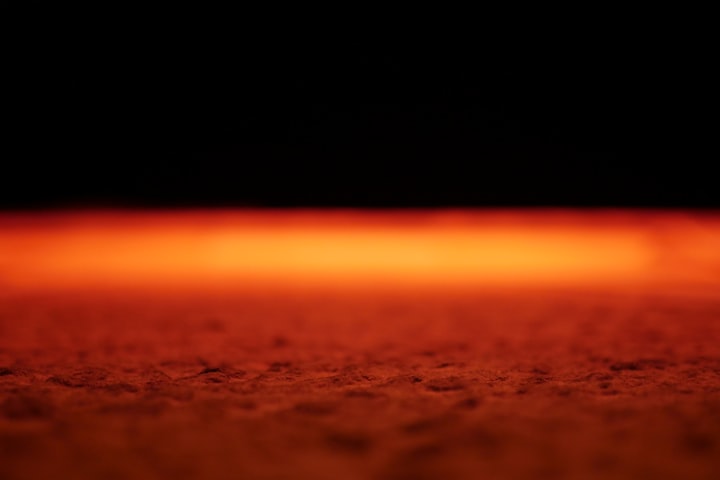Life On Mars
What happened when Earth died

A371 rubbed her eyes as the overhead lights began their sunrise simulation. She always woke up right at the start of the daybreak sequence. She didn’t mind. It meant she was first in the showers. She climbed down the ladder from her fourth-story bunkbed and padded quietly across the large dormitory, past the many rows of bunkbeds where other women were beginning to stir and stretch. She stepped under the water and enjoyed the early morning peace. As she continued out the other side and into the changing room, she saw the queue beginning to form at the entrance to the showers.
Jumpsuit on, she headed to the dispensary and joined the line. She was always first out of her dorm, but there were scores of dormitories and there was always a queue. It was one of those things you got used to in the colony. She received her pot of vitamins and supplements and moved on to the canteen. Tray in hand, she made her way to the next available seat to eat her morning meal. It wasn’t tasty, but she knew it was meticulously chosen by scientists for optimum nutrition, so she supposed that made up for it.
She ate the meal in silence, as always, not looking at her table companions. It was forbidden to chit-chat or joke or form relationships. Not that anybody had been punished for those sorts of infractions for a long time now. As she listened to the loudspeaker giving its morning updates on space conditions, missions, and the latest research, she thought to herself that it was surprising how quickly they had all become used to this life. Although they had been here 20 years now, so maybe it wasn’t that quick after all.
The end of Earth had come much more quickly than they’d imagined, quicker than even scientists had predicted. By 2040 fresh food was running out as the weather was too unpredictable to grow any crops. By 2045 land was running out as people fled from the fires, the floods and the earthquakes. The sea swallowed the world’s countries from the outside, and deserts consumed them from the inside. Cities began to crack and crumble as hurricanes tore them apart. Wildlife died out, taking a significant number of humans with them in the battle for habitable space. Whole nations and species disappeared.
By 2050 the Apocalypse was formally declared, and the remaining population was evacuated to Mars. But Mars wasn’t ready for them. The Chinese had won that particular space race when they landed their first crewed mission on the red planet in 2033. The Americans and Europeans had followed shortly after, and for the next 17 years had continued to visit, building up the settlements in preparation for the inevitable. But they had thought they still had decades ahead of them. The colonies weren’t ready for the thousands of humans that arrived.
The military, astronauts, and scientists took control from the beginning. They were gods among mortals. They were the ones with the knowledge and the training to handle the transition to life on Mars. They enforced strict discipline and routine from the very start. It was the only way. Every refugee from Earth was given an aptitude test, appointed to a work detail, and then shared out amongst the colonies. They had to be adapted quickly. The new settlers worked 18-hour days to extend and transform the colonies into a new home for thousands of people.
At first, most didn’t really want to talk. The last 10 years had been harrowing and draining, especially the final few months, and there wasn’t really anything more to say about it. They were also traumatised after losing everyone they loved, so no one was willing to risk getting close to anybody else again. The future of the colonies was far from secure after all. Besides all that, they were working punishing hours of hard physical labour, and at the end of the long day, they all fell into their bunks exhausted, their eyes closing as soon as their heads hit the pillow.
As the months wore on and the memories of the Apocalypse receded, people slowly started to interact. The leadership stamped it out immediately. Talk was restricted to the essential and the functional. There was too much work to be done, too many jobs unfinished, too much uncertainty about the future. They had to build colonies, not friendships, and there was no time to be wasted on the latter.
As years went by, relationships were outlawed all together. In these small colonies, it was essential to keep working together as one team to ensure the survival of all. The leadership couldn’t risk the harmony of their small society being destroyed by a friendship or partnership gone wrong. Scientists had invented artificial wombs way back in the ‘20s, so now everyone was sent for gamete harvesting at the age of 18, and new settlers were grown in laboratories and raised in dormitories, their unique ID created at conception.
A371 finished her morning meal, jumped up and took her tray to the washing pile. Nothing to be wasted, especially not time, was the unofficial motto on Mars. She headed to the Maintenance department and grabbed her toolkit. It was a large department, one of the most important. The colonies relied heavily on the mechanisms built to keep them alive, so workers rotated constantly around every single machine, oiling, maintaining, and fixing. Today she was destined for the 10-year-olds dormitory, working on their oxygen system.
Upon entering the dorm, A371 dropped her toolbox in shock. It landed on the floor with a clatter, causing the room of 10-year-olds to shriek, and tools spilled out across the floor. The girl who was closest, the girl who had made her heart stop and her hands weak, rushed over. A371 watched as her small hands gathered up the fallen tools and dumped them back in the box. She couldn’t take her eyes off the child.
The girl had A371’s curly brown hair and big green eyes. She had the same hands, down to the shape of the fingernails. She tucked her hair behind her ears in exactly the same way. She even had the same dimple in one cheek, although A371 hadn’t seen her own in many, many years. She supposed she must have smiled long ago. There was no doubt that this girl had been grown from A371’s gametes. She was looking at her daughter.
Her heart was beating so hard she thought it could be seen through the jumpsuit. Her stomach ached as emotions ripped through her. She’d thought they’d all gone, but they returned with a vengeance. Unfamiliar feelings flooded her body, coursing through her veins to the top of her head and the end of her toes. She was speechless. She couldn’t move. She started at the girl in awe.
The children’s instructor cleared her throat and looked pointedly at the clock. No time to waste. The girl stood up and headed off to the schoolroom without a backward glance. The children filed out of the dorm, and A371 picked up the last spanner with a shaky hand. Trembling, she raised herself to her feet and gazed at the locker the girl had taken her schoolbooks from. Her name was C952.
For the next few years, A371 kept a close eye on C952. She listened out for her name in morning and nightly updates, smiling internally when she came top of her class. She swapped work assignments so that she could maintain the machines in C952’s dorm or classroom, and worked extra hard knowing that she was doing it for her daughter. She switched canteens and routines so that she could eat at the same time at C952. Once she even managed to sit at the same table.
Her heart ached, and she yearned to talk to her. She couldn’t remember longing for anything so much in her life, certainly not in her decades on Mars. But she was scared, so she didn’t. She had no idea what punishment could be inflicted. Besides, C952 had been born in the colony, 20 years into the settlement. She didn’t know about life on Earth. She didn’t know about families or mothers or friends or hugs. What A371 wouldn’t give to hug her daughter.
At night, when the sunset simulation was nearing its end and the room was almost dark, she would take her heart-shaped locket out from the hiding place in the ceiling panel. She opened it and looked at her own parents’ smiling faces. She missed them so much now. Before she’d seen C952, her emotions had gone into hibernation. She’d forgotten she’d ever had them. Now, they were wide awake and torturing her every minute of the day. Sometimes she wished she’d never laid eyes on her daughter. But other times just catching sight of her in the canteen made her feel like life was worth living again.
One day, A371 was called into the supervisor’s office and informed that she had been promoted. She was being moved from Systems Maintenance to Structure Maintenance. Her manager shook her hand without much feeling and congratulated her woodenly. She had been a solid and competent worker, he told her impassively, and her contributions had been recognised. She had earned her place in her new department. She knew what it really meant.
Structure Maintenance workers were required to work outside on the surface of the Mars, working on the external parts of their colony. It was dangerous work that required extreme concentration and exertion. It was many hours of hazardous labour in the most intense environment in the colony. They were told they had been promoted due to their skill and experience. A371 knew it was a way of getting rid of those who were getting older and weaker. Some people did manage to hold on and complete the work alongside the younger workers. Most would be left to exhaust themselves and drift off into space.
For the rest of the day, A371’s mind was racing trying to decide what to do. It was her first mission tomorrow, and she knew she had to make contact with C952. She felt old and tired and weak, and she knew she wouldn’t survive the spacewalk. She didn’t fight it. It was her time. But some unexplainable, elemental instinct compelled her to communicate with her daughter.
In bed that night, while it was still light, she took a tiny scrap of paper and a pen and let the words spill from her heart and onto the paper. As the artificial sun disappeared and darkness descended, she reached up and took the necklace from its hiding place, folded the note as small as she could, and enclosed it within the locket.
A371 woke up and watched the simulated sunrise for the final time. She got up before everyone else and took her final shower. She skipped the dispensary and the canteen, because she wouldn’t be needing nutrition or vitamins any more. While the rest of the colony was either eating or queuing up to eat, she sneaked unseen into C952’s dormitory. She found her bed and slipped the locket under the pillow.
Standing in her spacesuit by the colony's exit, A371 thought of her daughter one last time. She was about to turn 18. Maybe one day she’d find her own child. A371 hoped with all her heart that families would be allowed again in the future. As a green light signalled the door was unlocked, A371 wiped away a tear and headed out on her final journey.
When the laundry crew arrived to change the bedding later that morning, B224 was surprised to find a gold chain attached to a strange shape under one of the pillows. Where on Mars had that come from?! What was it? It didn’t seem to have any useful function. What a waste of metal. B224 chucked the locket into the recycling bin on her trolley. Nothing to be wasted.
----------------------------------------------------------------------------------
The idea for this story was first conceived when I read about this:
About the Creator
Jenifer Nim
I’ve got a head full of stories and a hard drive full of photos; I thought it was time to start putting them somewhere.
I haven’t written anything for many, many years. Please be kind! 🙏






Comments
There are no comments for this story
Be the first to respond and start the conversation.